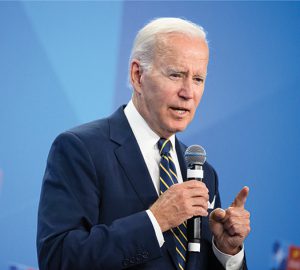Bloomberg
President Joe Biden and Xi Jinping ended their call Thursday with plans to hold their first face-to-face summit, but the US and China are unlikely to halt their bickering in the months before the two leaders finally meet.
The world’s two largest economies risk a fresh showdown as US House Speaker Nancy Pelosi kicks off an Asian tour Friday that could include a stop in Taiwan. China has warned of a “firm and strong†response to any such trip, raising the specter of a military show of force.
If Pelosi doesn’t land in Taipei, Biden will face domestic political pressure to undo the impression that the US caved to China’s demands.
Abrupt shifts from talks to threats have become a feature of the US-China relationship since former President Donald Trump followed up a triumphant state visit to Beijing in 2017 with his first tariffs against the country weeks later. Ties have only deteriorated since, as officials from both sides grow increasingly comfortable trading barbs while audiences at home cheer them on.
Biden and Xi’s latest call further solidifies the cycle of talking while fighting, with leaders agreeing to more meetings and working-level negotiations while exchanging jabs on strategic disputes. China pointedly declined to label the call as “constructive†—a term it had used on previous occasions — and Xi reaffirmed the threat of a military confrontation over Taiwan, telling Biden “whoever plays with fire, will get burned.â€
The pressure on both men to show strength is increasing as their respective economies falter under two-and-a-half years of pandemic strains. Biden is seeking to preserve a slim Democratic congressional majority in November elections, and Xi is approaching a crucial Communist Party congress that will determine whether he secures a third, precedent-breaking term in power as widely predicted.
The Pelosi trip comes during a week that Xi is expected to huddle with party elders at the seaside resort of Beidaihe ahead of the looming leadership reshuffle.
Most analysts expect China to signal its displeasure with any Taiwan trip by the California Democrat with warplane incursions or naval patrols near the island. A US aircraft carrier strike group is sailing towards the area, putting the American side in position to respond.
“The next few months will be especially strained because each country seeks to display resolve vis-à -vis the other ahead of a critical domestic event: midterm elections in the United States and the 20th Party Congress in China,†said Ali Wyne, a senior analyst at the Eurasia Group. “But that mutual desire transcends particular flash points, with efforts to gain competitive advantage increasingly overtaking those to cultivate durable coexistence.â€
A senior Biden administration official told reporters after Thursday’s call that it was important for the two sides to talk when tensions were high. The countries have areas of shared interest to cooperate on, including climate change, health threats and fighting drug trafficking, the official said.
US State Department spokesman Ned Price said that the talks were “keeping open the lines of communication, ensuring that we’re doing everything we can to ensure that the competition that defines the relationship between the United States and China does not veer from competition into conflict.â€
 The Gulf Time Newspaper One of the finest business newspapers in the UAE brought to you by our professional writers and editors.
The Gulf Time Newspaper One of the finest business newspapers in the UAE brought to you by our professional writers and editors.
